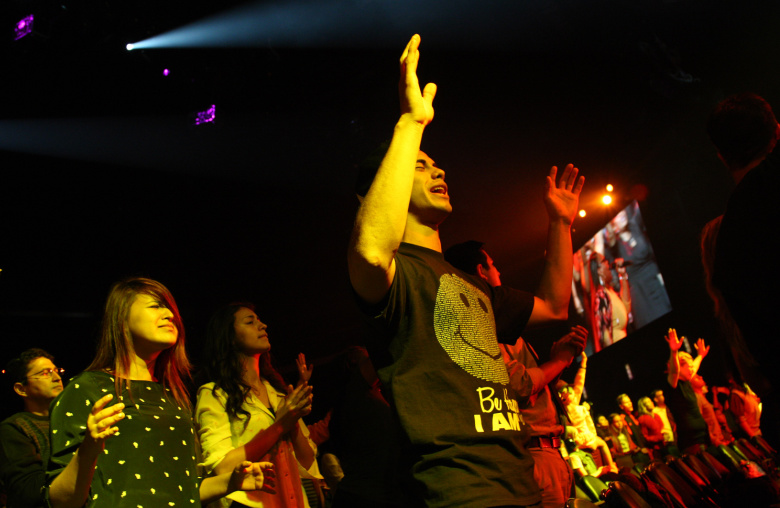
(Tommaso Boddi/Getty Images)
One of the best-known changes happening in American religion over the last few decades is the meteoric rise in the share of the general public that claims no religious affiliation on surveys. In the 1970s, it was just 5 percent of the public and now it has risen to nearly 3 in 10 adults. Among Generation Z, the numbers are much higher—with 48 percent of them identifying as atheist, agnostic, or having no religion in particular (“nones”) in data collected in late 2021.
However, what is often overlooked is that despite the fact that nearly half of young people identify as nones on surveys, there is still a robust share that self-identifies as born-again or evangelical when asked. Among college-aged white people, a quarter say that they are evangelical; it’s nearly 30 percent of African Americans, Hispanics, Asian Americans or those from other racial groups. Thus, there’s plenty of evidence that there will still be a significant portion of evangelicals in the electorate for decades to come, and they will be a noticeable force in electoral politics in both the short and long term.
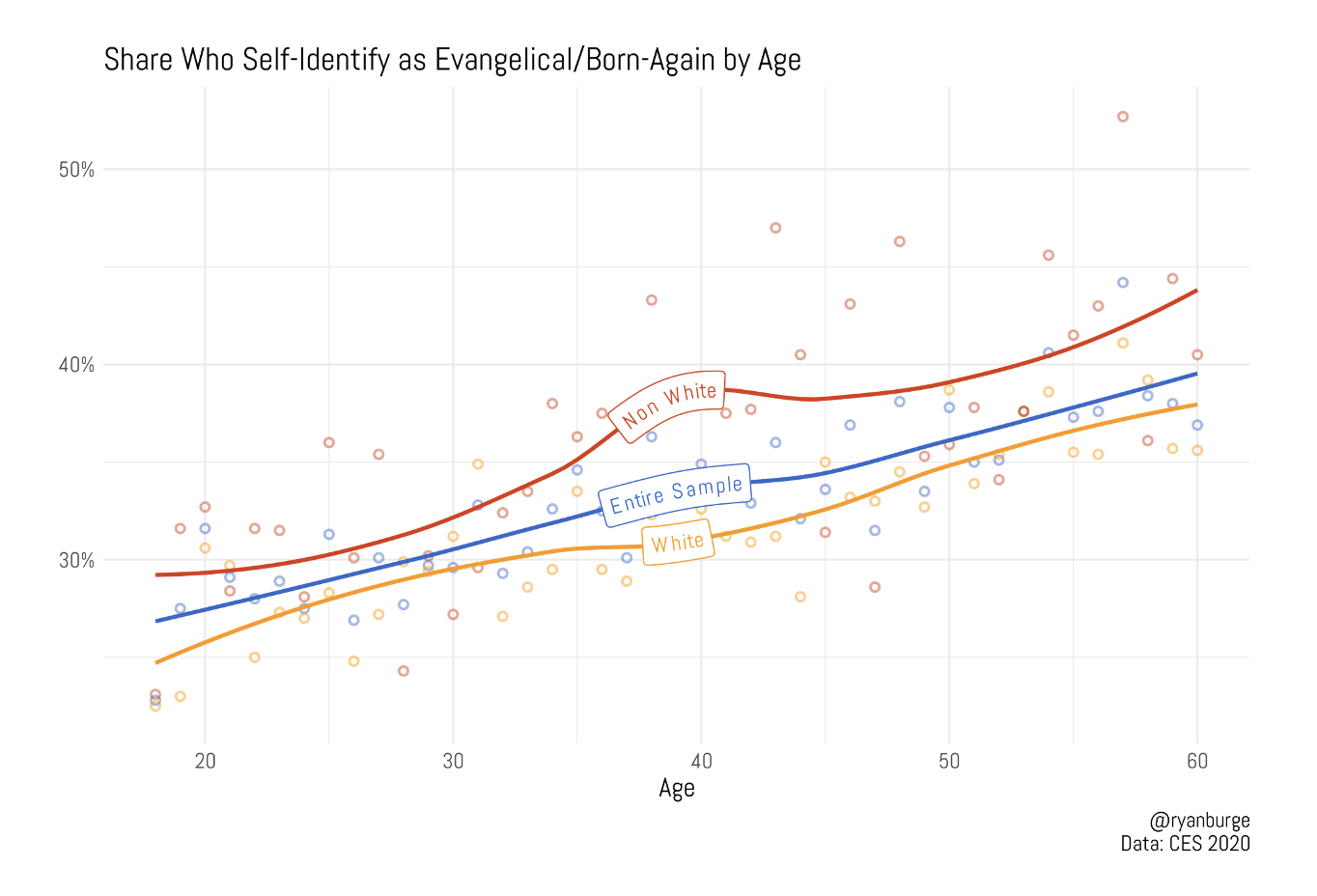
Given these numerical realities, it is important for both religious and political leaders to understand what political issues matter to these young people as they begin to shape policy and messaging for the 2024 presidential elections. To further elucidate some of the political concerns, Neighborly Faith—a nonprofit that promotes relationships between young evangelicals and people of other faiths—asked nearly 2,000 young people between the ages of 18 and 25 about how important 17 different issues were to them when it came to how they would vote. The results from the sample who self-identified as evangelical or born-again were telling.
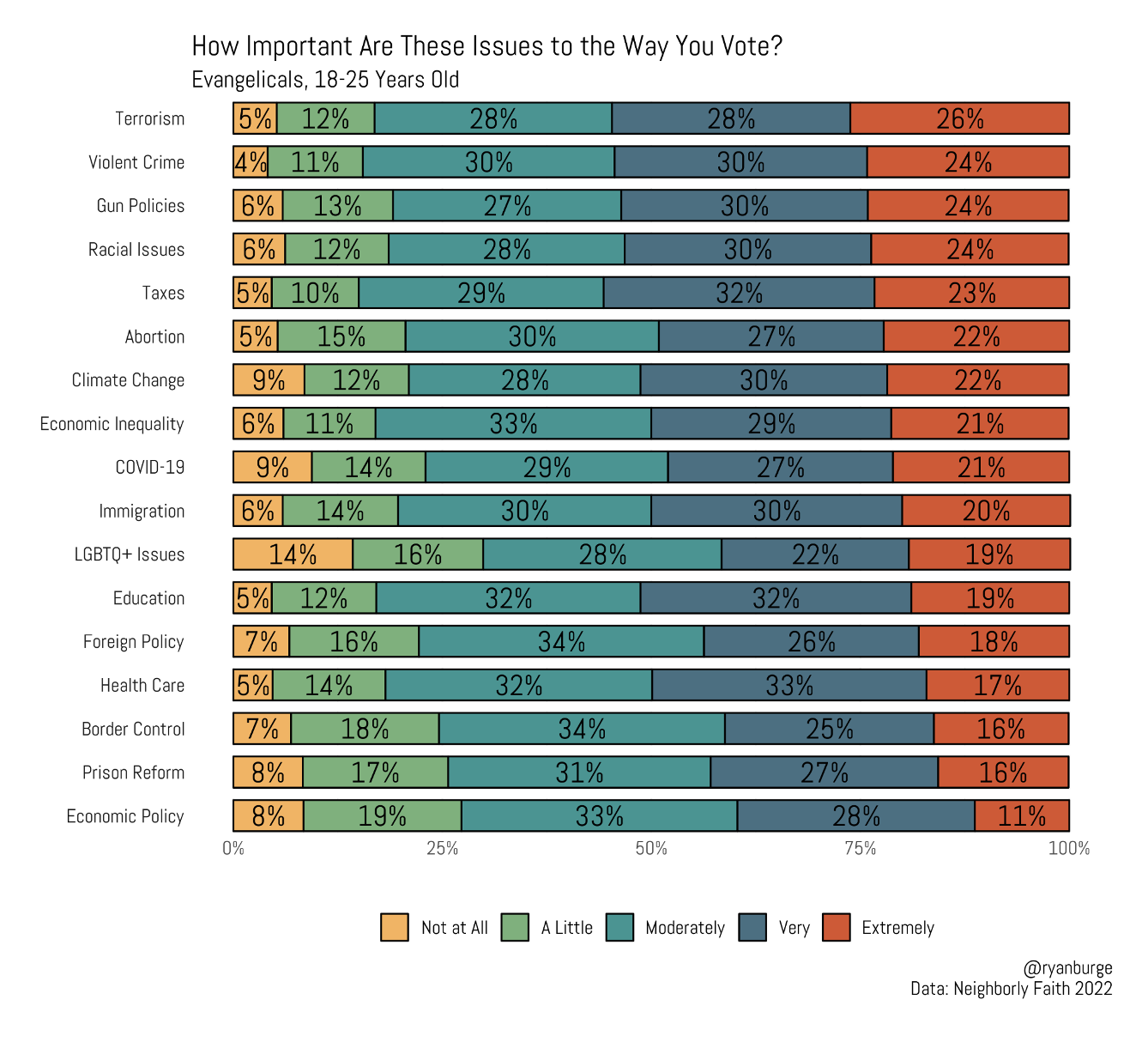
It’s worth pointing out that the top three issues to young people all involve violence: terrorism, violent crime, and gun policies. In each category, less than 20 percent of the sample said that these issues were not at all important or only a little important. In each case, majorities said that they were at least “very important.”
It’s also notable that racial issues score very highly among evangelical young people, with 54 percent saying that they are very or extremely important to them. Compare that to just 41 percent who indicate that issues surrounding the LGBTQ+ population were very or extremely important. It’s clear that race is a more salient topic to evangelical youth than issues about sexual orientation or gender identity.
But, there are other results that are worth contemplating a bit more. For instance, 49 percent of the evangelical sample said that abortion was very or extremely important, while just 5 percent said it was not important at all. Other issues scored lower. For instance, only 16 percent of young evangelicals said that border control was extremely important to their vote, which is similar to the issue of prison reform.
Looking broadly, it’s hard to easily summarize how evangelical young people think about issues from a variety of areas. For instance, a significant portion are concerned with taxes (53 percent), but only 39 percent express the same level of worry over the economy. Part of this might be due to the fact that they are young, and many of them may have not had to think too deeply about economic issues yet.
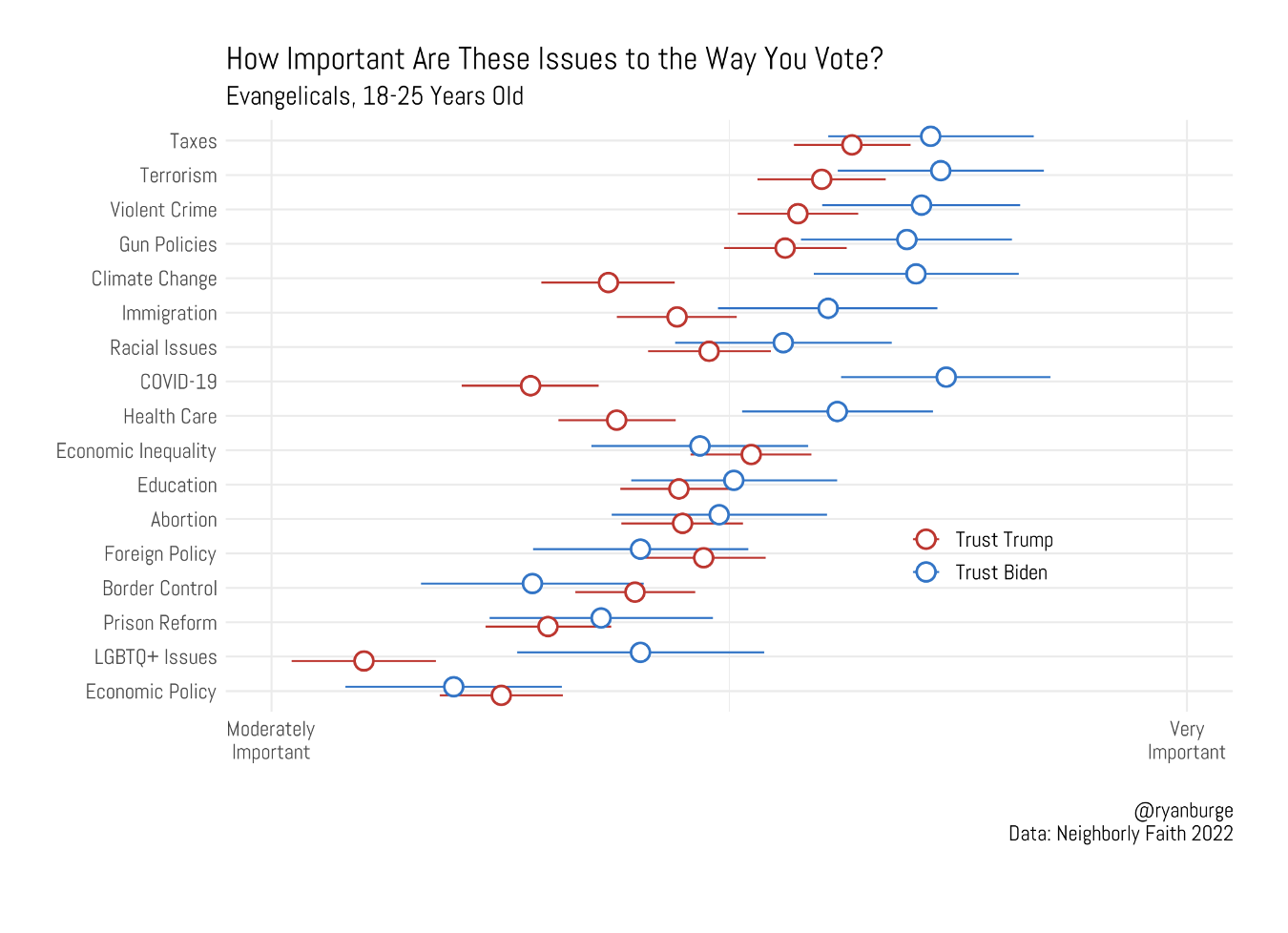
However, issues are often conceptualized through the lens of partisan attachments. In this survey, young people were asked how much they trusted Donald Trump and Joe Biden. These choices serve as rough proxies for the political identities of these evangelical young people. Given the overall partisan lean of evangelical adults, it’s not surprising that evangelical youth were significantly more likely to trust Donald Trump (40 percent) compared to Joe Biden (16 percent).
It is noteworthy that the issues of concern among those evangelical young people who trust Donald Trump does not look that much different than those who trust Joe Biden. On just four issues, the differences between the two groups are statistically significant.
Those four issues are illustrative of the divide between younger evangelicals who tend to lean toward the Democrats and those that favor the GOP. For instance, Covid-19 serves as a clear dividing line, with those who trust Biden seeing that issue as more important than those who trust Trump. The gap between the two groups on climate change is nearly the same as well. The other two areas of disagreement between these groups are on health care and LGBTQ+ rights.
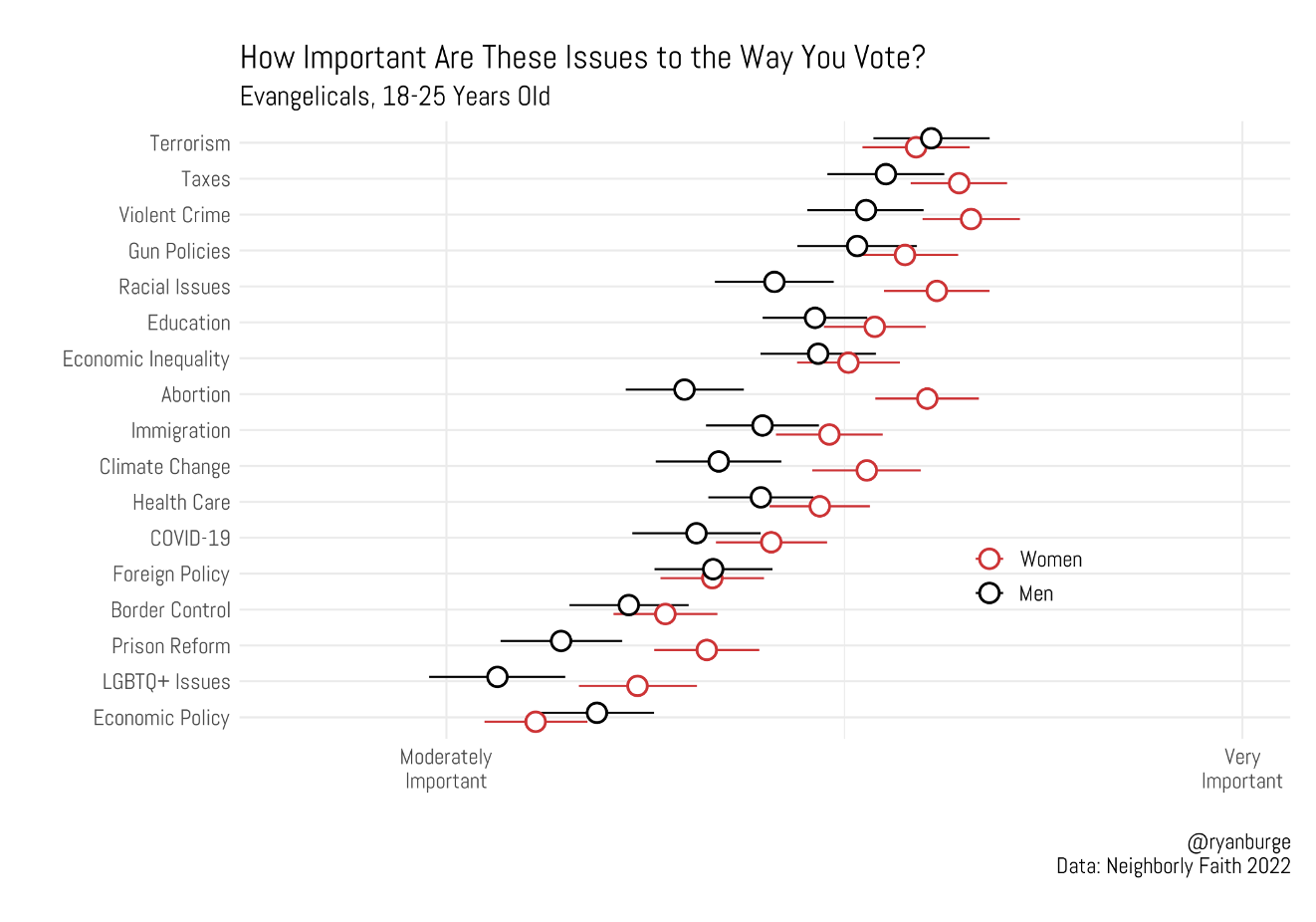
A breakdown based on gender is also instructive. There are several issues where the gender gap is hard to ignore. For instance, young female evangelicals are clearly more concerned about abortion than their male counterparts. The statistical divide on that issue is easily the largest of any that were asked about in the survey. But there are other areas where young men and young women weigh their concerns differently: Overall women were more concerned than men about LBGTQ+ issues, prison reform, racial issues, and violent crime. There is a larger point that can be easily missed when looking at the results based on gender, and that is that there is not a single issue that young men rate as more important than young women. That’s a clear and unmistakable takeaway from this analysis: Young men seem more apathetic about policies in all areas compared to their female counterparts. If that persists, that could become a key thread in the future study of religion and politics.
As I’ve argued in 20 Myths About Religion and Politics in America, it would be wrong to assume that younger evangelicals are more moderate than their parents or grandparents. Because evangelicals are often defined in the larger culture by their opposition to abortion and same-sex marriage—two positions that are increasingly out of step with young Americans—it stands to reason that only those who fully embrace all the positions of the evangelical movement would still embrace the label. That means that these younger evangelicals are likely more strident, outspoken, and unshakeable in their political beliefs than other young people. Because of this, it will be crucial for both scholars and politicians to continue asking how evangelical youth consider the social and political issues of the day.
Ryan Burge is an assistant professor of political science at Eastern Illinois University, the research director of Faith Counts, and a pastor in the American Baptist Church. He’s authored several books including The Nones: Where They Came From, Who They Are, and Where They Are Going and 20 Myths About Religion and Politics in America.